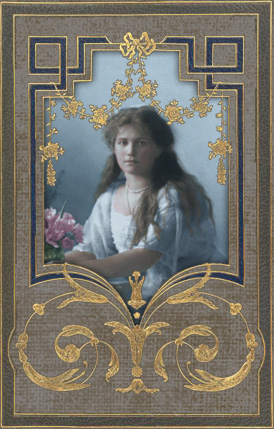Olson Defendorf Custom Homes wins prestigious design award from Houzz.







CHAPTER 17
LOST IN THE FOREST
BUT to return to Riel and our journey to Spala. As a general rule, when the hour for departure was late, the children and I went down to the train early in the evening when they were putting in the luggage, and we were then shunted into a siding, and I got the children to bed in good time quietly and comfortably and they slept till morning.
On this occasion there was no siding long enough to hold the train, so orders had been given that we were to move slowly up and down, and arrangements had been made that we should not disturb the general traffic.
We were hardly in the train when it went off at a perfectly terrific rate-eighty-five miles an hour I was afterwards told. In a few minutes we were all desperately sick from the rocking. The poor children were terrified. I feared every moment the train would topple over. The servants were on their knees praying; everyone was upset.
With great difficulty I made my way to the engineer to beg him to reduce the speed. He was very sorry, said he had not had any idea that the results of going at such a pace would be so frightful, but he could not now reduce the speed, as the risk of running into other traffic was too great. Our train was too long and heavy, and he could not stop it now, not even for five minutes. He wished to try the engines, he said, and thought that a good opportunity. For nearly four hours we rushed up and down in the darkness, through Germany, at this rate. Fortunately I had got the children to bed, and they slept, poor little mites, worn out by the fright and crying.
Both my elbows were bruised and sore, and my face suffered, too, from being dashed against the furniture and falling on the floor. The Emperor and Empress were greatly shocked at our appearance, and the Emperor was really angry when he heard what bad happened. I felt sick and giddy for a week after; it was more trying than a sea voyage.
The Empress had given me a present of a nice dressing-bag. I had it with me in the wagon, and saw it put out on the station at Spala; it, however, never arrived at the house. I t was stolen probably by one of the carters, and though we offered rewards we never heard of it. The priest even spoke from the altar, and said if it was only returned no questions would be asked, but it was never found. I was very sorry, as I had many little things in it which I valued exceedingly, and also a diary which I had kept concerning the children. The police even instituted a search in the neighbouring town, but all of no avail. I have already spoken of the forest in Spala, and while we were there a little child born the same day as the Grand Duchess Marie, and therefore about two years and four months old, was lost in this forest. She was the youngest child of one of the keepers, and was playing near her mother while the latter was preparing dinner. The door was open, and the wee thing toddled out and wandered away. The mother thought she was playing in the little garden, and was quite easy about her.
When the father came home to dinner the baby could not be found. Soon every man about the place was hunting for the lost child. The Emperor stayed at home from shooting that day, and guards, police, keepers, foresters and others all turned out to seek for the lost child. The terrible fear was that she had been carried off by some wild beast.
A cordon was drawn round twenty miles of the forest, and searched carefully. Neighbours stayed with the poor distracted mother, and a fire was kept up and hot water and soup, etc., were always ready. To add to the distress heavy snow fell. All night and far into the next afternoon search was continued, but without result, till a soldier who had been out all night and was returning saw something fluttering under a bush. Drawing near he found the little one on her hands and knees under the bush, soaked through and perfectly unconscious. He quickly carried her home; she was undressed and put to bed, and given restoratives. In the evening she was quite re covered playing about the cottage horne, and she very speedily forgot the whole story. It was a good thing she was so young, or the effect on her mind might have been disastrous.
We used to go long drives about Spala in a little pony carriage with just the coachman. I began to be afraid that it was not quite safe as an accident might happen to the ponies, and none of us spoke one word of Polish, and it would have been impossible to send for help if anything did occur, so I asked that a Cossack might be sent after us on horseback.
This was accordingly done. The first day after the change was made we were driving through a village when we saw a man running down a hilly field towards us. He was clad only in his night-shirt. I thought he must have escaped from his bed, in delirium, and that he might be suffering from smallpox or typhoid, so was rather frightened. However, as soon as he saw the Cossack he turned and ran in another direction without attacking us in any way.
Next day he was found, in the same costume, in a wood at some distance from the village. The police asked him who he was. He professed to be amazed at their ignorance, and proclaimed himself as the King of Poland. One of the police asked him, "Where is your passport?" "What!" he said; "you are a policeman, and don't know that a king has no need of a passport." He proved to be a dangerous lunatic much addicted to stone throwing.
When we stayed in Poland we generally took a certain number of local people into the house as servants, not that we wanted them, but just to give them employment.
I never saw such dirty people; they ran about the house in bare feet, often covered with mud from the roads. Their costumes consisted of a striped woollen petticoat, a black cloth three-quarter length jacket, a striped woollen apron tied over it, a similar apron round their heads or tied by the strings round the shoulders like a kind of shawl. They would only speak Polish, and professed not to understand when addressed in Russian, though I afterwards found, when it carne to a question of getting money, that they not only understood perfectly all that was said, but could read and write Russian with very few exceptions. The Russian who was paying them laughed heartily at my amazement at hearing them answer him in Russian and sign their names in the book for the money they received, but a golden key is very powerful all the world over.
Some time ago in St. Petersburg a lady whom I knew very slightly met me and said, "I gave that person you sent me twelve roubles, but I think it only right to tell you that I fear she is an impostor." Greatly amazed I asked her what she meant.
She told me a lady had called to see her; said she was a Pole and a great friend of mine and knew me intimately in Tsarskoe Selo; that I had helped her as much as I could, and then' evidently sent her amongst my friends and acquaintances to levy contributions on them. Miss C. offered her five roubles (about ten shillings), but she said it would be useless to her; she must have twelve to pay her rent, or she and her five children would be turned out in the snowy streets. Had her case not been urgent I would not have sent her, and so forth. Needless to say I knew absolutely nothing of the woman.
A couple of days after this she visited the Winter Palace, but not me; she knew better than that. She visited Madame G. and asked her to give her a situation in any capacity in the nurseries under me. Vainly Madame G. assured her there was no vacancy. "We could easily make one," she declared. She then begged for ten roubles and refused to stir till one of the Polish ministers was called upon. He sent for her to his room, and her story of her five little children was so sad that he gave her twenty roubles, and promised to make inquiries and get her work.
She was not known at the address given.
She next was heard of at the Grand Duchess Olga Alexandrovna's house, and went away with money and a good deal of work. The Grand Duchess was greatly interested in her.
She turned up at the Grand Duke Serge's house in Moscow, when she said she was Madame G., and had been called suddenly to the south of Russia, and was about thirty roubles short for her journey. Would Mademoiselle D. lend it to her, or should she apply to .the Governor?
It so happened that a personal friend of Madame G. was present, and was delighted at the prospect of seeing her, and went downstairs. To her amazement she was confronted by a stranger who explained that she was Madame G.'s servant.
Her mother was very ill in the south, and she had got a telegram saying to go at once if she wished to see her alive. Madame G. had hurried her off, but had not sufficient money to pay for the journey; she had told her to call at the Governor's house and mademoiselle would give her the money.
She had been in Madame G.'s employment for ten years, knew all about her rooms, and spoke so fluently that this money was given. Needless to say, no one belonging to any of the palaces ever saw either the woman or the money again.



